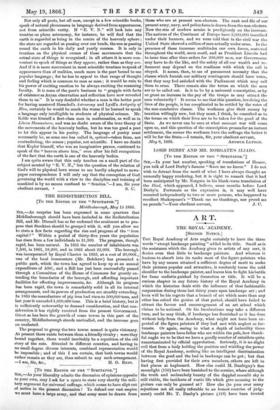[To THE EDITOR OF THE "SPECTATOR."] Sur,—As your liberality admits
the discussion of opinions opposite to your own, may I ask for a space to state very shortly the mili- tary argument for universal suffrage, which seems to have slipt out of notice in the present discussion ? To defend our vast empire we must have a large army, and that army must be drawn from those who are at present non-electors. The rank and file of our present army, navy, and police force is drawn from the non-electors. Now the size of modern armies is prodigiously on the increase. The nations of the Continent of Europe have 3,000,000 inscribed under their banners, and we were told that in the civil war the United State showed a million of men actually under arms. In the presence of these immense multitudes our own forces, scattered throughout the world, seem small, and as President Lincoln had to issue time after time orders for 300,000 mm, our Government may have to do the like, and the safety of all our wealth and re- finement may depend on the readiness with which the call is obeyed. It seems, then, to me of paramount necessity that the classes which furnish our military contingents should have votes, that they may feel satisfied with the Parliament which may call them to arms. There remain also the terms on which the men are to be called out. Is it to be by a universal conscription, or by so great an increase in the pay of the troops as may attract the men voluntarily? It seems to me that this question, involving the lives of the people, is too complicated to be settled by the votes of the non-combative clams. The workmen give their money by taxation willingly now, but they must, I think, be consulted as to the terms on which their lives are to be taken for the good of the State. As we never can be sure at what moment war will come upon us, and this question of the conscription presses for an instant settlement, the sooner the workmen have the suffrage the better it will be for the State.—I remain, Sir, your obedient servant,






























 Previous page
Previous page